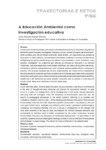Mostrar o rexistro simple do ítem
A Educación Ambiental como investigación educativa
| dc.contributor.author | Caride, José Antonio | |
| dc.date.accessioned | 2009-11-10T11:50:25Z | |
| dc.date.available | 2009-11-10T11:50:25Z | |
| dc.date.issued | 2007 | |
| dc.identifier.citation | Ambientalmente sustentable 2007, 3: 33-55 ISSN: 1887-2417 | es_ES |
| dc.identifier.issn | 1887-2417 | |
| dc.identifier.uri | http://hdl.handle.net/2183/5038 | |
| dc.description.abstract | [Resumo]A educación ambiental acredita unha ampla e diversificada traxectoria de discursos e de prácticas altamente suxerentes para a investigación educativa, en que –a pesar dos logros que se acadaron– aínda constitúe unha liña de traballo emerxente. Neste sentido, con argumentos que afonden as súas raíces na crise ecolóxica, a complexidade dos saberes ambientais e a procura de alternativas pedagóxicas aos graves problemas que nos afectan como sociedade e como civilización, o seu quefacer investigador –na confluencia que articulan as Ciencias da Educación e as Ciencias Ambientais, coas súas respectivas comunidades científicas– non deixan de situarnos ante temas, estratexias e métodos caracterizados por unha constante apertura epistemolóxica, conceptual e empírica. Non só polas mudanzas que se foron experimentado nos modos de ler e interpretar as relacións educación-ambiente, que hoxe complican as controversias que existen entre a educación ambiental e a educación para o desenvolvemento sustentable; tamén polos significados científicos, académicos e até ideolóxicos que estas relacións comportan para as persoas e os procesos de cambio social. Neste tema centramos a atención deste artigo. | es_ES |
| dc.description.abstract | [Abstract] In just over thirty years, Environmental Education has accumulated a vast array of contributions in the form of thought-provoking discourse and practice for educational research, an area which is, in spite of its achievements, still an emerging field. In this sense, through arguments stemming from the ecological crisis, the complexity of environmental know-how and the search for pedagogical alternatives to the severe problems affecting us as societies and civilisations, research within this area —at the meeting point between Educational Sciences and Environmental Sciences, with their respective scientific communities— has placed us over and over again before topics, strategies and methods which reveal a permanent epistemological, conceptual and empirical flexibility. And this is not just a consequence of the changes that have been observed in the way we read and interpret the interface between education and environment, an interface which is further complicated by the current controversy between Environmental Education and Education for Sustainable Development. It is also related to the scientific, academic and even ideological meanings involved in such an interface for both people and processes of social change. This will be the focus of attention in the present paper. | es_ES |
| dc.language.iso | glg | es_ES |
| dc.publisher | Universidade da Coruña | es_ES |
| dc.subject | Educación ambiental | es_ES |
| dc.subject | Investigación educativa | es_ES |
| dc.subject | Saberes ambientais | es_ES |
| dc.subject | Crise ecolóxica | es_ES |
| dc.subject | Complexidade | es_ES |
| dc.subject | Interdisciplinariedade | es_ES |
| dc.subject | Environmental education | es_ES |
| dc.subject | Educational research | es_ES |
| dc.subject | Environmental know-how | es_ES |
| dc.subject | Ecological crisis | es_ES |
| dc.subject | Complexity | es_ES |
| dc.subject | Interdisciplinary relationships | es_ES |
| dc.title | A Educación Ambiental como investigación educativa | es_ES |
| dc.type | info:eu-repo/semantics/article | es_ES |
| dc.rights.access | info:eu-repo/semantics/openAccess |






